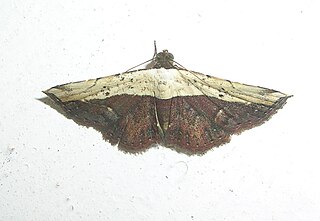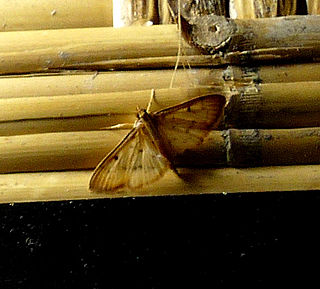Related Research Articles

Gracillariidae is an important family of insects in the order Lepidoptera and the principal family of leaf miners that includes several economic, horticultural or recently invasive pest species such as the horse-chestnut leaf miner, Cameraria ohridella.

Metoeca is a genus of moths of the family Crambidae. It contains only one species Metoeca foedalis, which has a wide distribution, including the Democratic Republic of Congo, Equatorial Guinea, South Africa, China, Japan, Taiwan, Thailand and Australia (Queensland).
Leguminivora is a genus of moths belonging to the subfamily Olethreutinae of the family Tortricidae.

Oruza divisa is a species of moth of the family Erebidae first described by Francis Walker in 1862. It is found in Asia, including Hong Kong, Sri Lanka, Sulawesi, Taiwan, Japan and in Africa south of the Sahara, including Indian Ocean islands.

Platyptilia farfarellus is a moth of the family Pterophoridae. The species was described by Philipp Christoph Zeller in 1867. It is found from central and southern Europe to Asia Minor, Micronesia and Japan. It is also known from Africa, where it has been recorded from Equatorial Guinea, Kenya, Madagascar, Mauritius, Nigeria, South Africa, São Tomé & Principe, Tanzania, Uganda, the Seychelles and Malawi.

Glyphodes negatalis, the karanj defoliator, is a moth of the family Crambidae. The species was first described by Francis Walker in 1859. It has a wide range in the tropics, including South Africa, The Gambia, Mali, India, Sri Lanka, Hong Kong, Japan and eastern Australia.
Lamoria adaptella, the plain lamoria, is a species of snout moth in the genus Lamoria. It was described by Francis Walker in 1863 and is known from South Africa, the Gambia, Kenya, Mozambique, India, Sri Lanka, Indonesia and Singapore, as well as Japan and Taiwan.
Dolicharthria bruguieralis is a species of moth in the family Crambidae. It is found from France, Portugal, Spain, Italy, Croatia, Romania, Bulgaria, the Republic of Macedonia, Albania, Greece and Turkey, east to Japan and Taiwan. It is also found in Africa, including Morocco, Algeria and South Africa.

Herpetogramma basalis is a species of moth in the family Crambidae. It is found on the Canary Islands and in Japan, China, Australia, Sri Lanka, India, Indonesia, La Réunion, South Africa, and Mali.
Mussidia pectinicornella is a species of snout moth in the genus Mussidia. It was described by George Hampson in 1896. It is found in southern and south-eastern Asia from Bhutan to New Guinea, in Australia and Fiji, Taiwan, Japan, southern Europe and in Réunion.
Faveria dasyptera is a species of moth in the family Pyralidae. It was described by Oswald Bertram Lower in 1903. It is found in the Australian state of Queensland.
Faveria poliostrota is a species of moth in the family Pyralidae. It was described by Boris Balinsky in 1994 and is found in South Africa.
Faveria subdasyptera is a species of moth in the snout moth family (Pyralidae). It was described by Hiroshi Yamanaka in 2002 and is endemic to Okinawa, Japan.

Gracillariinae are a subfamily of moths which was described by Henry Tibbats Stainton in 1854.

Glyphodes pyloalis, the lesser mulberry snout moth, lesser mulberry pyralid or beautiful glyphodes moth, is a moth in the family Crambidae. It was described by Francis Walker in 1859. It is found in Iran, China, Japan, India, Indonesia (Sumatra), Sri Lanka, Taiwan, the Democratic Republic of the Congo, Equatorial Guinea, Mozambique and North America, where it has been recorded from Florida, Maryland, North Carolina, South Carolina and Virginia.

Nacoleia charesalis is a moth in the family Crambidae. It was described by Francis Walker in 1859. It is found in Australia, India, Sri Lanka, Borneo, Sumbawa, the Philippines, Singapore, Thailand, Japan, Taiwan and on the Seychelles.
Herpetogramma stultalis is a moth in the family Crambidae. It was described by Francis Walker in 1859. It is found in Malaysia, India, Sri Lanka, China, Japan, Pakistan, Papua New Guinea and Australia, where it has been recorded from Queensland. In Africa, it has been recorded from the Democratic Republic of the Congo and Réunion.
Omiodes poeonalis is a moth in the family Crambidae. It was described by Francis Walker in 1859. It is found in the Democratic Republic of the Congo, Sierra Leone, Tanzania, the Chagos Archipelago, China, Indonesia, Sri Lanka, Japan and Australia (Queensland).
Patania quadrimaculalis is a moth in the family Crambidae. It was described by Vincenz Kollar and Ludwig Redtenbacher in 1844. It is found in Japan, Taiwan, Bhutan, Borneo, India, Nepal, China, Korea and the Russian Far East. It is also present in Equateur in the Democratic Republic of the Congo.

Patania sabinusalis is a moth in the family Crambidae. It was described by Francis Walker in 1859. It is found in Cameroon, the Democratic Republic of the Congo, Kenya, the Seychelles, Somalia, Uganda, Zambia, Sri Lanka, India, Borneo, Java, Fiji, the Solomon Islands, Taiwan and Japan.
References
- ↑ De Prins, J.; De Prins, W. (2017). "Epicrocis signatella Pagenstecher, 1907>". Afromoths. Retrieved November 14, 2017.
- ↑ Savela, Markku. "Faveria Walker, 1859". Lepidoptera and Some Other Life Forms. Retrieved July 20, 2017.
- ↑ Japanese Moths
| This Phycitini-related article is a stub. You can help Wikipedia by expanding it. |